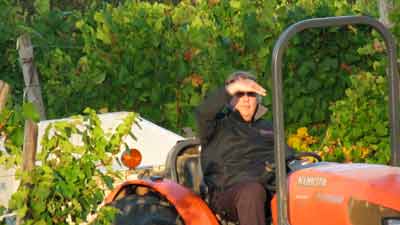As a vineyard grower, Kevin Chambers of Resonance Vineyards in Carleton, Oregon, is on the 32nd harvest for this property. He’s using everything in his 3 decades of growing grapes to create a broader theory of how an effective farm should operate. Chambers combines the best practices from biodynamics, organics, and conventional agriculture from first-hand knowledge he has acquired over the years.
He spent his childhood on farms (his dad’s family grew cherries and his mother’s grew barley and wheat) and his teenage years engaged in the environmental movement in Eugene. So when he started farming, he naturally gravitated towards organic methods, although the vineyard was not certified as such. He hit a turning point in his farming philosophy in 1992, when he met soil scientist Frank Wann.
“I started to focus on-on soil and nutrition, making sure that my soil was as healthy as possible—the concept being ‘take care of the soil and the plants’ll take care of themselves,” he said.
Chambers dove into the biodynamic farming movement, attending conferences all over the United States and working on his own tinctures. He also took all of Dr. Elaine Ingham’s soil biology classes at Oregon State University.
“I tried to employ those techniques in my own farming, and I have to admit after a few years it became clear that’s just not the whole story. It really didn’t work quite the way Elaine was purporting it to work,” Chambers said.
Another attempt to fully implement the studies of soil chemist Dr. Neil Kinsey also didn’t pan out as advertised.
“I went a lot of money trying to balance my soil just so. And it never really happened. And so I became dubious,” he said. “Gee, it’s not just soil chemistry and it’s not just soil biology.”
Currently, he’s working to combine all he’s learned about biology, chemistry and physics into a larger theory. He abandoned biodynamics three years ago and he is willing to use chemicals on the field, if close examination shows that the plants respond. He calls this method “eclectic farming.”
“We need to work through all of the various disciplines, not just biodynamics, not just organics, not just conventional to a study that brings us to growing better food,” he said. “This is about achieving balance and harmony in all of these arenas.”
He’s also bringing technology into the field, using a refractometer in an attempt to judge the number of “nutritional building blocks” each plant has, and using infared guns to see if plants are healthy.
Organic and biodynamic farmers aren’t the only ones who might consider his methods heretical. His elderly aunts, who were members of the Women’s Christian Temperance Union, came to visit the vineyard one day and never came back.
“She looks around here and she said, ‘Well, Kevin, what is this crop? I’ve never seen this before.’I said, ‘Well, Ernestine, these are wine grapes.’ And she gave me this glassy stare and said, ‘Kevin, that’s the devil’s work.’”
Most of the videos featured on Cooking Up a Story were produced, filmed, and edited by Rebecca Gerendasy. Fred Gerendasy contributed as a writer to many of the posts and occasionally as the interviewer. Visit Rebecca Gerendasy Clay – Art and Fred Gerendasy Photography to see their current work.

